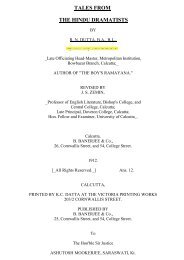TEUTONIC MAGIC - Awaken Video
TEUTONIC MAGIC - Awaken Video
TEUTONIC MAGIC - Awaken Video
Create successful ePaper yourself
Turn your PDF publications into a flip-book with our unique Google optimized e-Paper software.
the All-Father: his sexual ambiguity and the externalization of "Loki's children," the Fenris-Wolf and<br />
Midgardhr's Wyrm, both acknowledged as antitheses to the weal-working powers of the gods, and both<br />
being beasts associated with the cult of Odhinn and necessary for the transformation of Ragnarok. Loki is<br />
a fire-spirit. He is never counted among the gods by anyone, but he is the blood-brother of Odhinn-a part<br />
of Odhinn, as all the beings identified as his "brothers" are, who carries out his will in ways that may<br />
either be clear to see or hidden behind the veil of poetic drama.<br />
HEIMDALLR<br />
Heimdallr's origin is shrouded in much vagueness, due to the loss of the poem which is supposed to have<br />
told of his history and legends, the Heimdalisgaldr. It is written that he is the son of nine mothers, who are<br />
also nine sisters; these have been identified with nine waves and/or giantesses. He is called brightest and<br />
highest- minded of the gods, and the white god. Although seemingly one of the Aesir, he shares the Vanic<br />
wisdom of foresight. He has been slain at least once, with a man's head. It is suggested that the "nine<br />
mothers" motif may show that he was killed and reborn nine times. He is the guardian of Bifrost, keeper<br />
of the Gjallarhorn which he will blow at the beginning of Ragnarok. Heimdallr can hear everything that<br />
happens throughout the Nine Worlds. His hearing, like Odhinn's eye, is kept in the Well of Mimir. One<br />
might easily suspect that both references indicate the identical awareness of "that-which-is" as well as<br />
"that-which-is-becoming."<br />
Branston suggests a similarity between Heimdallr and Agni of the Rig Veda: both are sons of the waters,<br />
both are described as white with teeth of gold, both are sons of multiple mothers, guardians, and fathers of<br />
the social classes of humanity. The association with Agni, who is clearly identified as sacred fire, and his<br />
role as guardian of the fiery bridge Bifrost, as well as his ceaseless struggle with Loki (the spirit of<br />
uncontrolled fire) would seem to show Heimdallr as the embodiment of the sacred flame.6 He is also<br />
called Vindler (Turner or Borer), which might associate him with the need-fire. Alternatively, the Odhinn/<br />
Heimdallr/Loki triad may be seen as a precise reflection of the Odhinn (air)/Hoenir (water)/Lodurr (fire)<br />
triad, with Heimdallr distinctly watery and virtually Vanic in nature.<br />
The animal associated with Heimdallr is the ram; he also turned himself into a seal to fight with<br />
Loki once.<br />
As a side of Odhinn's being, he embodies the omnipresent and uplifting Odian consciousness-that<br />
which strives ever after the highest.<br />
TYR<br />
As mentioned in the description of the rune tiwaz, Tyr (also called Tiwaz, Zio), cognate to Zeus, was the<br />
original Germanic sky father god, although only a few stories about him have survived, most notably that<br />
of the binding of the Fenris Wolf. Tyr is the chief god of the Thing. He gives justice, honor, courage, and<br />
wisdom in battle. He is associated with the sword as well as the spear. The sword-dance was part of his<br />
worship among the Swabians, and several scholars have identified him with the sword-god Saxnot.<br />
Though largely left out or displaced in myth, he remained one of the great figures in the religious life of<br />
the folk, particularly on the Continent.<br />
ULLR<br />
This god, whose name means "glory," was not known on the Continent; he appears to be a native<br />
Scandinavian sky-god, possibly Finnish, whose place was taken by Odhinn. He is particularly singled out,<br />
even by Odhinn, as among the highest of the gods. It has been suggested that he is the "all-powerful god"<br />
by whom, along with Freyr and Njord, vows on one oath-ring were sworn; he is associated with the oath<br />
ring in other places as well. His worship was fairly widespread in Scandinavia, although he is seldom<br />
mentioned in the myths.<br />
It is written in one source, the severely Chrisfianized and euhemeristic Saxo, that Ulir took<br />
Odhinn's place and bore his name for a time; and there are also references to the alternating worship pf<br />
Ullr in the winter and Freyr in the summer, which would show that the worship of this god was confined<br />
to the winter months, at which time it equaled or superseded that of the others. The name "Ulir" may be<br />
etymologically connected with Yule; it has also been suggested to be a reference to the lights of the<br />
aurora borealis in the winter sky<br />
136
















